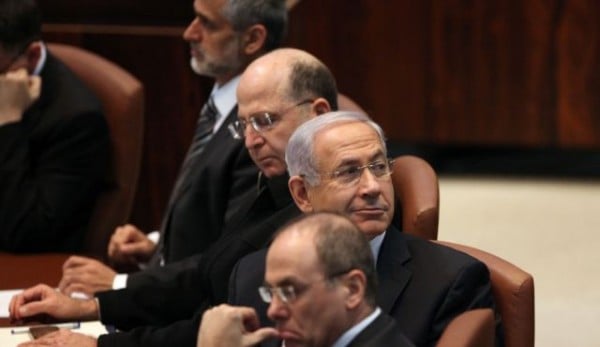
Prime Minister Benjamin Netanyahu, just before introducing Israel’s 33rd coalition. Photo by Emil Salman
After weeks of negotiation, and, predictably, right before his already-extended deadline was set to expire, Prime Minister Binyamin Netanyahu announced the formation of a majority coalition in the Knesset (Israeli legislature). The coalition, in addition to including the pre-election alliance between Likud, the main right-wing party, and Yisrael Beiteinu, the Russian immigrant-oriented party headed by Avigdor Lieberman, also includes newcomer Yesh Atid, the new centrist party led by former TV personality Yair Lapid, Habayit Hayehudi, a religious-Zionist party led by former settlement leader Naftali Bennett, and Hatnuah, a hastily formed center-left party led by former Kadima leader Tzipi Livni.
The most notable theme that emerged from the elections was the glaring absence of the peace process in the parties’ respective agendas. Hatnuah was the only significant party that urgently advocated for renewed negotiations with the Palestinians. Under the coalition agreement, Tzipi Livni will be given the task of restarting these negotiations, but given that Hatnuah is a junior party with only six seats, it seems unlikely that Livni will wield enough power to drive the process forward.
There are various reasons for the absence of peace negotiations in the parties’ respective platforms. The social protests that swept across the country in the summer of 2011 forced most parties to focus on domestic issues such as job growth and affordable housing. In fact, these protests largely account for the revival of the Labor Party, the once-dominant left-wing party that had been marginalized in recent elections.
Secular Israelis’ growing irritation with the military draft exemptions and generous subsidies granted to the Haredi (ultra-Orthodox) community also helped to push diplomacy off the national docket. The meteoric rise of Yesh Atid was partially fueled by its demand for Haredi military conscription, and its emergence caused the Haredi bloc to lose its traditional role as kingmaker in coalition deals.
Meanwhile, Habayit Hayehudi is ideologically opposed to the creation of the Palestinian state, while Likud-Beituni has shown little interest in reviving peace talks over the last four year while they were in power.
Finally, most Israelis are disheartened by the lack of progress in negotiations with the Palestinian Authority. After unilaterally withdrawing from Gaza in 2005, they have been rewarded with a fairly steady barrage of rockets by Hamas into southern Israel. The Palestinian Authority has not only failed to consistently condemn Hamas for their militancy, they have engaged them in an off and on courtship over the last few years. These overtures have signaled to Israelis that the Palestinian Authority is disinterested in truly making peace.
These factors have all contributed to the formation of a government that will be decidedly lukewarm about resurrecting peace talks in the coming year.